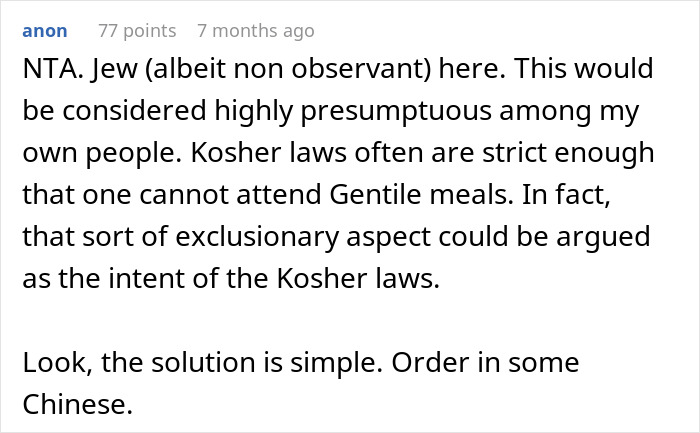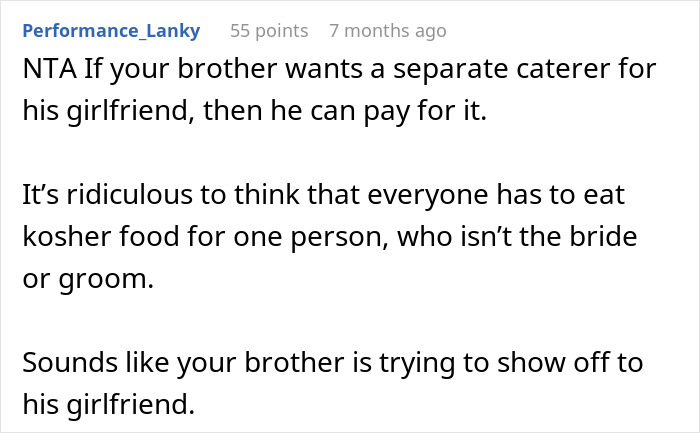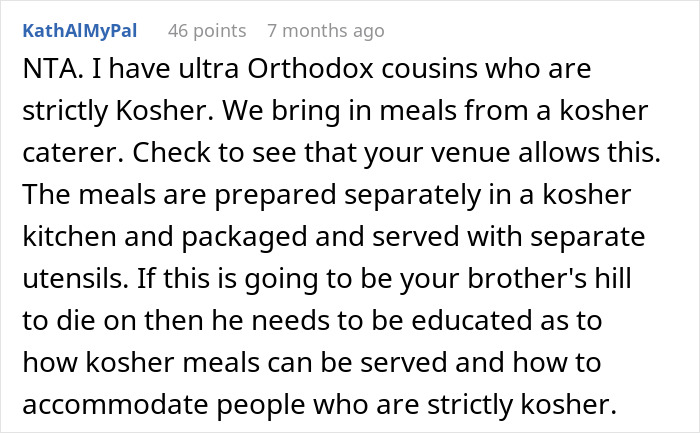Weddings today are more about juggling guest lists, budgets, and increasingly, a growing web of dietary restrictions. From gluten-free to dairy-free, nut allergies to vegan preferences, modern brides and grooms often go above and beyond to make sure every guest feels seen and fed.
However, even the best intentions can cause unexpected conflicts, especially when religious or cultural practices add a new layer of complexity. Today’s Original Poster (OP) found herself in exactly that situation when she agreed to provide a kosher meal for her brother’s girlfriend, only to be told her plans weren’t good enough.
More info: Reddit
Between choosing a wedding venue, picking the dress, and managing a guest list, choosing a menu can also quickly become a major headache
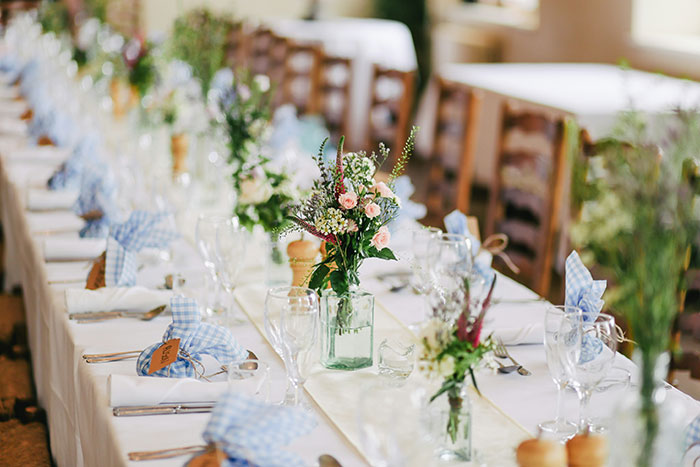
Image credits: Photos by Lanty / Unsplash (not the actual photo)
The author planned her wedding menu, including special meals for guests with allergies, and agreed to provide a kosher meal for her brother’s girlfriend
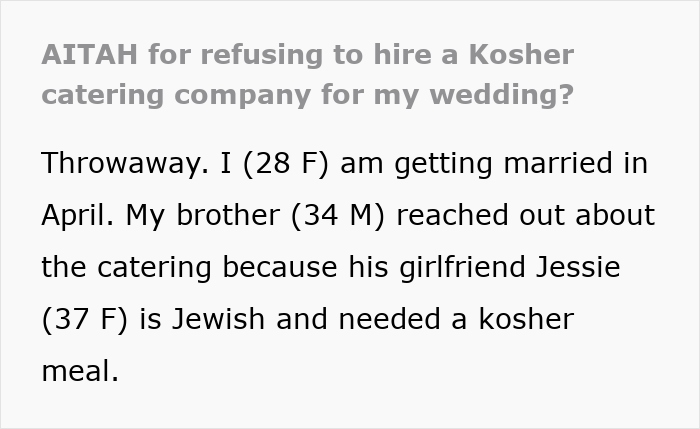



Image credit: anon
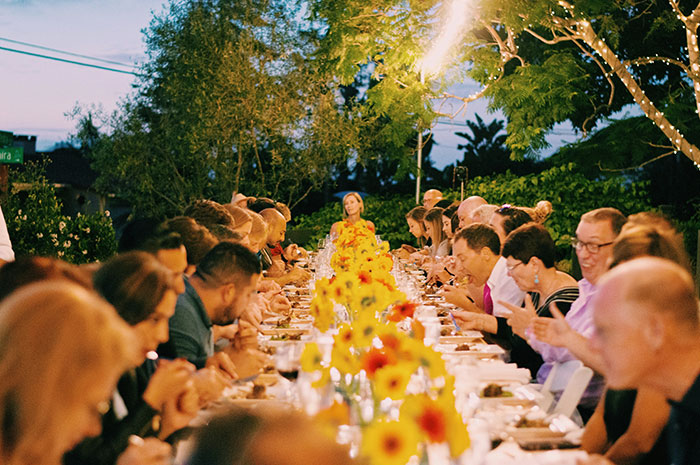
Image credits: Jesse Vigil / Unsplash (not the actual photo)
Her brother insisted that the kosher meal wasn’t enough, explaining that the entire catering had to meet strict kosher rules, including preparation and storage
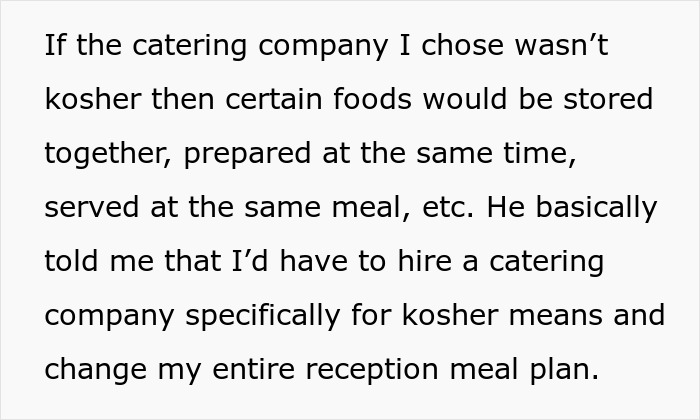
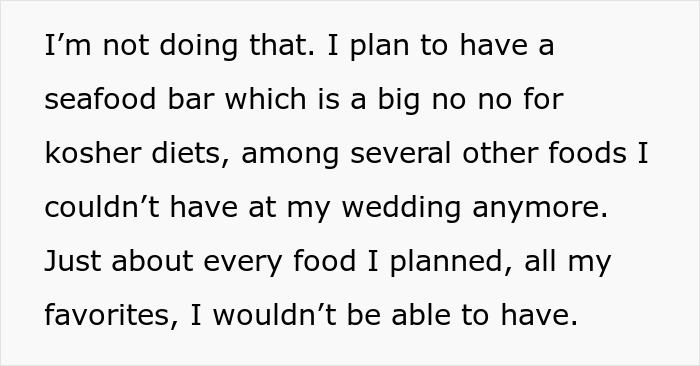

Image credit: anon

Image credits: Gabriel Ponton / Unsplash (not the actual photo)
He demanded she hire a kosher catering company and change her entire menu, which would increase costs by thousands and eliminate many of her favorite foods




Image credit: anon

Image credits: Curated Lifestyle / Unsplash (not the actual photo)
She refused, offering that the girlfriend could bring her own meal, but the brother reacted angrily, accusing her of excluding his girlfriend


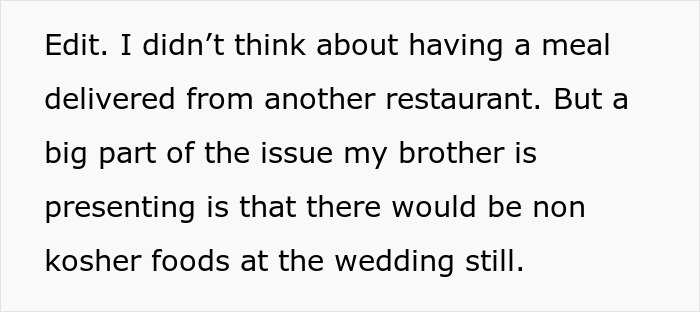
Image credit: anon
She also feels justified in standing her ground, arguing that her brother’s girlfriend, whom she hasn’t even met, shouldn’t dictate her wedding plans
The OP initially welcomed the request to include a kosher meal for her brother’s girlfriend who follows Jewish dietary laws. She even factored it in alongside other special dietary needs like nut, dairy, and gluten allergies.
However, when her brother explained that kosher requirements go beyond what’s on the plate and is more about how the food is prepared, stored, and served, things got complicated fast. Faced with these strict kosher standards, the OP’s brother told her that she’d have to hire a fully kosher catering service to avoid cross-contamination and ensure everything met religious laws.
For the OP, this meant scrapping her planned menu, which included seafood, and many of her favorite dishes. Beyond losing her dream menu, the kosher catering would cost thousands more. When she declined to overhaul her catering plan, her brother then accused her of excluding his girlfriend.
In turn, she suggested the girlfriend could bring her own meal, but that suggestion was met with anger, seen as disrespectful and unreasonable. The conflict boiled down to how much one should adjust their plans for a new family member, especially one barely known, as the OP pointed out that the girlfriend had only been dating her brother for four months.

Image credits: Tima Miroshnichenko / Pexels (not the actual photo)
Perfect Wedding Guide acknowledges that budgeting plays a crucial role in wedding catering decisions. However, they advise couples to be transparent about their financial limits and carefully review all associated costs such as deposits, cancellation terms, and added fees. This guidance is relevant in the OP’s story, where accommodating a single kosher guest would have inflated the catering cost by $3,500.
On that note, Vogue states that bringing your own food to a wedding is typically seen as unusual unless it’s been clearly communicated and approved by the couple in advance. Since weddings are hosted events where meals are provided, guests are generally expected to eat what’s served or notify the couple early about serious dietary needs.
They highlight that if suitable accommodations can’t be made, the polite alternative is to eat beforehand or discreetly bring small snacks.
In all, New Jersey Bride affirms that planning a wedding within a big, opinionated family can be both supportive and stressful. While it’s helpful to have people to lean on, they suggest that couples should present a united front, communicate with empathy, and confidently stick to their core decisions. The key is to find common ground where possible, but also to honor your non-negotiables.
Netizens supported the OP, with many calling her brother’s demands unreasonable and out of line. Some with dietary restrictions themselves shared that they never expect hosts to cater to them so extensively. They also pointed out the absurdity of making a major financial and menu shift for someone the bride hasn’t even met, especially after only four months of dating.
What do you think about this situation? Where do you think the line is between being accommodating and being taken advantage of? We would love to know your thoughts!
Netizens argued that it is indeed unreasonable for the author’s brother to expect her to change the whole menu just for his girlfriend






